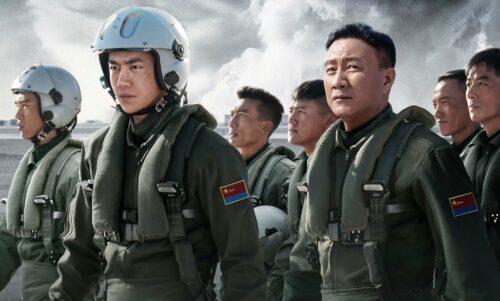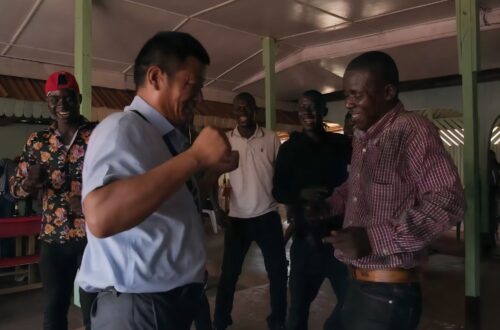‘Beijing Bastards’: An unsavory portrait of ’90s Beijing with legendary rock star Cui Jian

It can seem slapdash and aimless — it is not a great film, after all — but Beijing Bastards, with its grimy aesthetic, successfully captures a time, place, and subculture, when inertia and despair played itself out in Beijing’s shadowy alleyways and sleazy apartments.

Since its appearance in the 1980s, Chinese rock has been closely associated with Beijing. Thanks to their anti-establishment and individualist themes, the music of early Chinese rock musicians like Cui Jian 老崔 — who turns 58 years old today — strongly resonated with university students and urban intellectuals.When the student protests broke out in Tiananmen Square in 1989, they sang and listened to songs like Cui’s trademark “Nothing to My Name” (一无所有 yīwúsuǒyǒu). The singer even played a brief concert for the protestors two weeks before the tragedy of June 4.
In the years following the Tiananmen Square protests, rock continued to be an outlet for young people who felt alienated and disillusioned. Chinese rockers wore jeans and long hair, promoting rebellion and shunning conformity. In Beijing, rock bands were busy, but confined to the underground circuit of bars and nightclubs. The early 1990s represented the height of the genre; two of the biggest bands of the time, Black Panther 黑豹 and Tang Dynasty 唐朝乐队, reached album sales that numbered more than a million.
Director Zhang Yuan 张元 and his 1993 film Beijing Bastards 北京杂种 perfectly capture this glorious, short-lived world. Zhang, who had earlier directed rock music videos and the acclaimed docudrama Mama 妈妈 (1992), made Beijing Bastards outside of China’s studio system. Hong Kong director Shu Kei 舒琪, Australian cinematographer Christoper Doyle, and Cui Jian all helped to produce it, while funding was provided by foreign investors. Adding to its authenticity, Zhang also decided to cast real rock musicians, including Cui and 1989 frontman Zang Tianshuo 臧天朔.
While Cui and filmmaker Tang Danian 唐大年 are credited as the movie’s screenwriters, some scenes were improvised, while others are concert footage of Cui’s performances. The story is loose and impressionistic, following a twenty-something rocker named Karzi. In the opening scene, Cui wails out “Tolerate” 寬容, a slow, sax-heavy love song featuring lyrics like “I don’t love you anymore / but I don’t hate you either.” The music is then set to a moment between Karzi and his girlfriend Maomao, as they argue in the rain about whether the young woman should get an abortion.
The fight ends with Maomao running off, vanishing into the rain. Karzi is concerned, but he doesn’t let Maomao’s disappearance interfere with his usual routine. He owns a bar, and his days consist of sleeping until noon, drinking, doing drugs, having sex, and getting into fights. The movie’s other “bastards” aren’t living much better. Cui Jian and his band are kicked out of their rehearsal space. Daqing, a writer, strains his relationship with a friend over getting some stolen money back. A painter, Jin Ling, wants to stay in Beijing but can’t afford it. All of these artists are united by their anger, aimlessness, and isolation from the rest of society.
Beijing, of course, is as much a character as the bastards. Zhang, however, doesn’t depict the capital as the modern, ambitious city that would host the Summer Olympics a decade later. None of the city’s famous landmarks are shown, and the movie’s vast crowds, shadowy alleyways, and sleazy apartments make for an alien, faceless place. The handheld camerawork, cramped and stationary, is suffocating. There isn’t any hope here, only despair and inertia.
I loved this grimy aesthetic, and the way the movie mixes real-life with fiction is certainly interesting. Yet, like its cast of bohemians, Beijing Bastards unfortunately suffers from a lack of direction. The constant scenes of drinking and meandering establish a boring sense of repetition, with conversations that seem trivial or pointless. The subplot involving Cui, playing himself, struck a fan like me as the most engaging, with none of the tedium as the rest of the segments. The style and music are the definite highlights of Beijing Bastards, capturing a subculture that was just about to come crashing down.
1993, the year Beijing Bastards was released, is considered the beginning of the end for the Chinese rock boom. As the genre commercialized, it softened its social and political edge. Young people lost interest, preferring sweeter, poppier music. It also didn’t help that the scene was largely centered in Beijing, or that the Chinese authorities limited public rock concerts and banned the music from being played on TV. The government had no love for Beijing Bastards either, banning it from the mainland. When Zhang’s movie played at the Locarno Film Festival, the Chinese government protested by removing its own entry from the contest.
From the vantage point of 26 years later, when a rock contest is now the subject of a series on iQiyi, Beijing Bastards is a curious piece of history. For all its flaws, it’s fascinating to see such a niche time and place on film, no less with the appearance and music of the era’s most influential figure.
Film Friday is The China Project’s film recommendation column. We’re currently featuring Chinese films available on Netflix. Have a recommendation? Get in touch: editors@thechinaproject.com





